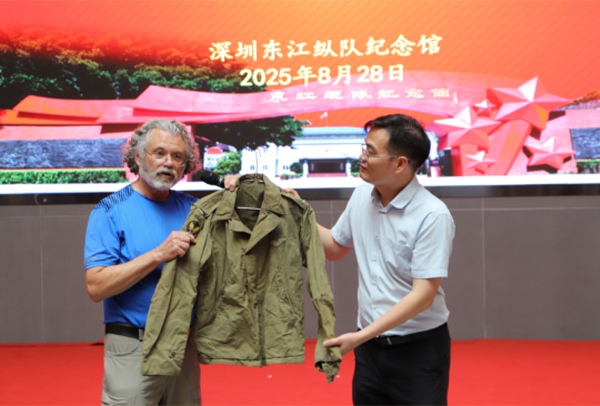 Local News
Local News
David Kerr (L) donates the aviator jacket worn by his father, Lt. Donald W. Kerr, during WWII to the Dongjiang Column Memorial Hall in Pingshan District on Aug. 28. Photos from the memorial hall
David Kerr, son of U.S. “Flying Tiger” Lieutenant Donald W. Kerr, donated the aviator jacket his father wore during World War II (WWII) to the Dongjiang Column Memorial Hall in Pingshan District on Aug. 28.
In response to this generous gift, which embodies a shared memory between China and the U.S., the memorial hall presented an ink painting to David Kerr as a symbol of the enduring bond between the peoples of the two countries.
On Feb. 11, 1944, during a U.S. air raid on the Japanese-controlled Kai Tak Airport in Hong Kong, Lt. Kerr’s fighter plane was attacked by Japanese forces. He bailed out and landed on a mountainside, where he was rescued by the Dongjiang Column guerrillas. After 48 days of moving between hiding places, including locations in Shenzhen, Lt. Kerr was able to return safely to his base in Guilin, Guangxi.
“This aviator jacket has finally returned to where the story began,” David Kerr said, recalling that his father often spoke of the Dongjiang Column guerrillas’ bravery and sacrifice.

The aviator jacket Lt. Kerr wore during WWII.

David Kerr (C) visits the Dongjiang Column Memorial Hall in Pingshan District on Aug. 28.
Since 2008, Kerr has made multiple visits to China, retracing his father’s escape route and meeting surviving Dongjiang Column members to express his gratitude. “I always wondered about the places and people he encountered during that escape. It was the museum in Pingshan where I first saw an exhibit about my father’s rescue, which led me to the Dongjiang family. From there I met hundreds of former soldiers and their families. This memorial hall is very important to me,” he said in Pingshan on Aug. 28.
“As a result, I’ve made hundreds of friends and have had many opportunities to celebrate the cooperation between our parents and the friendship among their children and grandchildren,” he added.
The Dongjiang Column of the Guangdong People’s Guerrilla Force Against Japanese Aggression was formed in 1943 after several reorganizations of earlier guerrilla units. The column played a crucial role in southern China’s battlefield resistance to Japanese aggression. Zeng Sheng, a native of Pingshan, served as its commander. Opened in 2000, the memorial hall displays historical documents, photographs, and personal items donated by veterans.

David Kerr, guests, and memorial hall staff pose in front of a screen displaying a historic photo of Lt. Kerr shaking hands with Zeng Sheng in Shenzhen.

David Kerr (2nd R) and sons of Dongjiang Column veterans hold historical photos while posing for a group photo.
The ink painting presented to David Kerr depicts Maluan Mountain, symbolizing Pingshan’s revolutionary roots and spirit. It reflects the Dongjiang Column’s valor and the cross-border friendship forged in wartime.
Also on Aug. 28, Zeng Sheng’s sons, Zeng Deping and Zeng Kaiping, together with Jiang Shan, son of veteran Li Zhaohua (who also helped rescue Lt. Kerr), presented David Kerr with precious photos and photocopies of old letters.
Kerr’s donation coincides with the 80th anniversary of the victory in the Chinese People’s War of Resistance Against Japanese Aggression and the World Anti-Fascist War. The jacket not only enriches the memorial hall’s collection but also provides valuable material for the study of China-U.S. cooperation during the war.

David Kerr (2nd L) receives an ink painting depicting Maluan Mountain from the memorial hall.